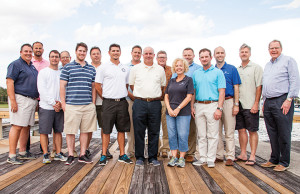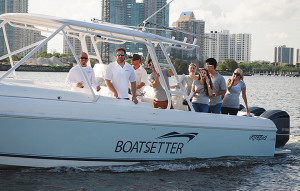Boat clubs, sharing models enter strategic partnerships, grow industry
In order to get new boaters involved in our industry, it seems that all we need to do is open the door and invite them in.
If that is the case, boat clubs and boat sharing are the surrounding gate that gets these potential consumers closer to the end goal of ownership.
That first experience, when boaters are “hooked” into the lifestyle, is the aim of everyone in the boating industry. After that, boating sells itself. Boat clubs and sharing models have the same aim but offer an entry point for those who do not have the means to afford a new boat immediately.
“It’s getting that first experience that I think is so critical for the industry that platforms like Boatbound help people do,” said Chris Oetting, director of business development at Boatbound.
Boat clubs and boat sharing models also help open the door to a younger audience. According to Boatsetter CEO Jaclyn Baumgarten, over 60 percent of its site visitors are under the age of 44. This is lower than the average age of boat buyers across all categories, according to data from Info-Link Technologies. (Further data on the average age of boat buyers can be found in the 2015 Market Data Book.)

“It’s a shift in mindset and it’s really a gateway for getting younger people into boating,” said Baumgarten.“We are focused on bringing in that younger demographic and creating great memories and experiences for them out on the water, which will encourage them to continue to seek out on-water experiences and eventually buy a boat themselves.”
Boat sharing models allow owners to offset the costs associated with maintaining a boat, which is critical as affordability remains a significant obstacle for the industry.
“With one or two rentals a month, it covers their slip fees, it can cover their fuel costs, it can cover their maintenance costs, and it can help people think about getting into boating because now they know they can offset the cost of ownership when they go to buy that boat,” said Baumgarten. “At its core, what we’re trying to do is make boating far more accessible and affordable on both sides of the relationship – from people who want to get out on boats and people who want to own boats.”
John Giglio, president and CEO of Freedom Boat Club, believes boat clubs have become, in the overall life cycle of boating, the new “entry-level boat” that allows customers to truly find what they want – not something they think might be the right fit. By partnering with dealers and manufacturers, the club can move customers who have fostered a love for boating toward someone who can help them purchase the true boat of their dreams. Giglio said this is actually better for the industry in the long term, rather than focusing on the micro goal of selling a single boat today.
“Those are the customers that are saying the two happiest days [of a boat buyer’s life] are the day you buy and the day you sell it. We need to get rid of that stigma and we need to put them in the boat they want out of the blocks,” said Giglio. “With the relationships we have with the manufacturers and dealers, now we send them [for example] to the local Hurricane dealer in Sarasota to go buy his Hurricane 22-foot deck boat, because that’s what they decided [they like].”
Growth through partnerships
With the increased popularity of boat clubs and boat sharing comes new partnerships. Boatsetter merged with Cruzin in September 2015, now operating under the Boatsetter brand name and incorporating the Cruzin look and feel. The companies merged the two websites and added the features and functionality of both platforms.
“We realized this really was a match made in heaven. The areas that each of the independent companies had been focusing on were completely different. When you brought everything together, it was completely accretive,” said Baumgarten. “When you have a lot of new, burgeoning companies in a new marketplace, consolidation is a very natural direction … and we knew that it would be a fast way for us to accelerate and grow.”
The merger allowed Boatsetter to increase its fleet and on-water services. The company offers a new and improved revenue share model for its users with a 70-30 revenue split in the favor of the boat owner. Owners also have better capabilities to vet captains and match them with their boats.
“When [renters] go to pick a boat, [they] can actually look and pick between three to five captains that the owner has approved for that boat, and [they] can read the other reviews people have written about them or what experience they’re looking to offer,” said Baumgarten.
Boatbound also entered into a new partnership this year with SailTime. Unsold fractions at SailTime franchises can now be listed on Boatbound, which last until the fraction sells or can be a permanent rental fraction for the location.
“We think that boat [club] models are really good for the industry as a whole, as it’s getting people that first experience into boating,” said Oetting. “Ultimately, we’re trying to solve the common challenges of the industry, [which] are certainly based around affordability and accessibility. We view that, working together, we can more aptly come together to solve that problem.”
Freedom Boat Club entered into a different kind of partnership this year. Bobby Parker is a Freedom Boat Club franchise owner and happens to be the nephew of David Parker of Parker Business Planning. Bobby approached the company and suggested looking into hosting a 20 group meeting for its franchisees, and after months of discussions regarding the benefits, Giglio decided it made sense to participate.
“[Boating] is a very unique industry,” said Giglio. “It’s not like your traditional franchise of a Subway or McDonald’s where you’re getting the same hamburger in Spain as you are in Texas. Any way that we can continue to bring that consistent membership experience … we saw the 20 group as a great opportunity to do that and really focus on how to become a successful franchise.”

While 20 groups are standard to most industry professionals, they are an entirely new concept for a boat club. However, after attending the 2014 Top 100 gala and realizing 11 of the 13 top dealers were Parker 20 Group members, Giglio said it was an easy decision to move forward with Parker.
“Even though we’re a 26-year-old business and we know a lot about running boat clubs, I think there’s a lot we’re going to be able to ascertain from David, his experience and the experience of some of these other people in the marine industry by running the 20 group,” said Giglio. “When we can look at our financials on an individual basis and compare them as a group, it really gives a lot of guidance on how to more efficiently run the business, and that was what the takeaway for many of these guys were.”
As Freedom Boat Club continues to look at the industry in the long term, it has also begun to embrace the work the Recreational Boating and Fishing Foundation has done to engage the Hispanic market, and Freedom Boat Club is following that example. The company brought in Maurice Amaya to strictly focus on multicultural market development. Freedom Boat Club is working on betas right now in the Naples and Tampa Bay markets.
Giglio said boat clubs offer these Hispanic customer and opportunity to learn how to boat, what options are available and create new purchasers down the road.
“We’re pretty excited about that,” said Giglio. “With the changing demographics … these are up-and-coming middle- to upper-class families that don’t historically have a boating background, and we feel like the boat club concept fits perfectly into what’s going to attract this group of people into boating.”
Good citizens
The perception that boat clubs and boat sharing models are stealing customers has slowly begun to dissipate, particularly as these businesses continue to actively position themselves as an aid to getting more boaters on the water.
Giglio has worked for the past four years on clarifying misconceptions around the boat club model and whether or not it competes with customers, and he has seen the reputation of boat clubs generally improving. Freedom Boat Club aims to be a good citizen by finding new opportunities for collaboration with industry stakeholders.
“Boat dealers, marinas and manufacturers out there, we’re all in essence selling the same thing, and that’s time on the water,” said Giglio.
Freedom Boat Club has engaged in several new partnerships in the past year with organizations such as Power Squadron Training; Ladies, Let’s Go Fishing; Discover Boating; the National Marine Manufacturers Association and more.
“There are resources we have as a fully functioning, operating boat club with 950 boats in the water around the country that we’re anxious to partner with [industry] groups to be able to let them help get people on the water,” said Giglio, “and the more people on the water, the better it is for everybody.”
In order for everyone in the industry to be able to unite, Giglio says everyone needs to focus less on their business’s roles in the industry on a micro level.
“I think that everybody in the industry needs to be thinking more on a macro level, which is not about the boat I sell today or the boat I rent today or the boat club membership I sell today; it should be a focus on what are we doing today to grow the industry tomorrow,” said Giglio. “It’s the collaboration of all of these groups to try to figure out the quickest, most efficient way to get more people on the water, which will help the industry long term.”




